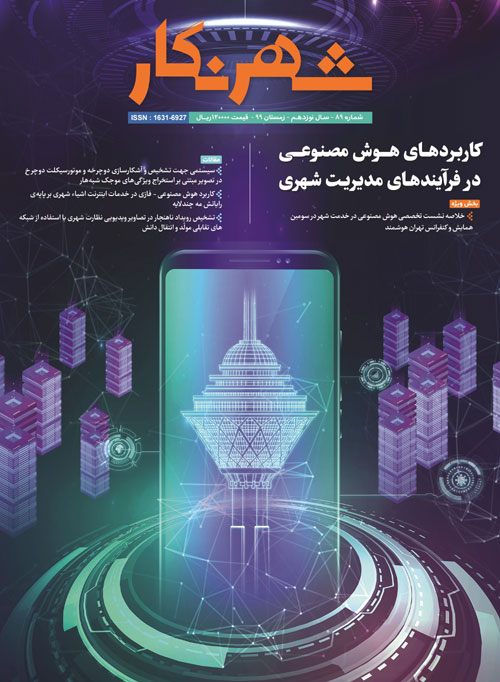فهرست مطالب
دو ماهنامه شهرنگار
پیاپی 85 (1398)
- تاریخ انتشار: 1398/03/15
- تعداد عناوین: 11
- سخن نخست
-
صفحات 3-4
- بخش ویژه
- اخبار
- معرفی کتاب
-
صفحات 47-48
-
صفحه 53
-
Pages 14-22
Right to the Smart City is an emerging concept which points to the possibility of claiming the right to the city by the citizens of the smart city. Citizen-centric smart cities are what urban policymakers assert to create by turning to smart technologies. It’s assumed that such a claimed approach can be operated in the tradition of reflexive urban governance by expanding availability of the smart city infrastructures to all citizens to have the right to produce, own, and consume spaces based on reflexive knowledge. The main question of this article is whether citizens of the smart city are in a practical discourse that can improve the quality of their urban life through changing the urban space based on the claiming for the right to the city. Based on theories about the relationship between citizens and the smart city categorized in three main discourses of “control city”, “creative city” and “smart citizen” and also Henri Lefebvre’s “Right to the City” theory, we have explained the concept of right to the smart city which can be expected to be fulfilled in the form of reflexive urban governance.
Keywords: Right to the City, Right to the Smart City, Smart Citizen, Creative City, Control City, ReflexiveKnowledge, Reflexive Urban Governance -
Pages 23-33
Today, moving to smart cities is one of the most important concerns of government leaders and rulers, in which the evolution for the process of creating or improving citizen services and utilities is quite evident. Previous studies have shown that the main factor in this evolution is how to use urban data collected from stakeholders and physical systems located in the city and to release data for use by different users. Today Open data policy is aimed at providing innovation potential for businesses, governments,and entrepreneurs, which sometimes pose challenges.In this paper, the findings related to the study of multiple cases by using data in smart cities, open data capabilities and the reasons for moving to open data platforms, the challenges of using data, as well as the role of private and public institutions in data dissemination are presented and also deals with the activities carried out in Iran and potential available. However, the knowledge required to use data in smart cities needs further studies.
Keywords: Open Data, government, data policy, smart cities -
Pages 34-42
One of the major problems in Tehran is its increasing pollution that in addition to respiratory and pulmonary problems, affect the learning and the memory of the residents of the city, especially children which every year Tehran municipally officials have come up with different ways to tackle with this problems by some methods such as even-odd scheme for car traffic leading to create less CO2 in the city. In this paper, we use 14 different data from 3 various meteorological stations located in the polluted area of the city for presenting our model. The reason for utilizing the three-month data of the winter in also the phenomenon of the weather inversion through this season in which we confront the most polluted season of the year. Using the data, we propose a regression model as well as a neural network to predict the winter air pollution index and compare the results and error rates with the actual values. These models can be used on a platform designed to make more precise and better decision making, taking into account all parameters that are related to the pollution, in order to reduce air pollution as much as possible.
Keywords: Regression model, neural network, pollution index, traffic, Tehran, meteorology


